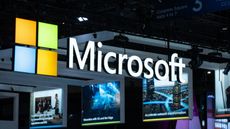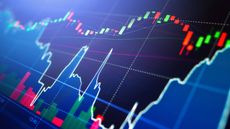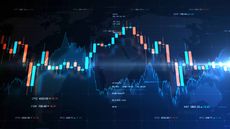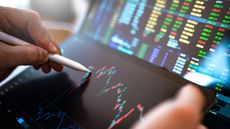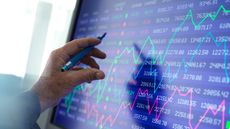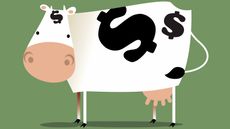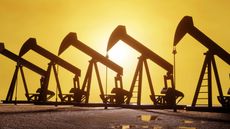Best Defensive Stocks to Buy Now
Investors are concerned about the financial sector and the economy, but these best defensive stocks have risk-averse traits that can help calm those fears.
- (opens in new tab)
- (opens in new tab)
- (opens in new tab)
- Newsletter sign up Newsletter


Benjamin Graham, who is widely known as "the father of value investing," argued that defensive stocks should be moderately priced, have a good record of paying dividends and be conservatively financed.
This is what long-term value investors are looking for now. Given the volatility in the financial sector and with rising interest rates, investors are looking for stocks with defensive qualities.
This means finding the best stocks to buy that will preserve investors' capital over the long term. Moreover, the top defensive stocks have the ability to grow their dividends.
Typically, these defensive companies generate a sufficient amount of free cash flow (FCF) that can support both dividend payments and also stock buybacks. FCF is the amount of cash flow that exceeds all the company's cash expenses (not including depreciation and amortization, for example). In addition, FCF covers the company's capital expenditure needs like new plant and equipment purchases, as well as working capital spending. What's left is "free" to be spent on dividends, buybacks, debt reduction, acquisitions of companies and cash accumulation.
It's often the case that these companies are boring. But they are profitable and can keep growing even when economic conditions are rough. In any event, they have a long history of generating good profit margins and cash flow during a variety of economic cycles. In addition, their price-to-earnings ratios are moderate and they have good dividend yields. These qualities make them good defensive plays for the long term.
With that in mind, here are the six best defensive stocks to buy now.
Data is as of March 23. Dividend yields are calculated by annualizing the most recent payout and dividing by the share price.

Wendy's
- Market value: $4.4 billion
- Dividend yield: 4.8%
Wendy's (WEN (opens in new tab), $20.77) is the second largest hamburger quick service restaurant (QSR) chain in the U.S. and the third largest globally. It has 7,095 restaurants globally as of Jan. 1, 2023, the majority of which are in the U.S. Most of these are franchised owned QSRs - 93.3% of the stores in the U.S. are owned by 217 franchisees, and 98.9% of the international QSRs are owned by 106 franchisees.
People love the Wendy's menu. Its earnings, cash flow and dividends are growing, and the company forecasts meaningful growth next year, as well. For example, global same-store sales were up 4.9% in 2022, thanks in part to 12.4% international growth. In addition, total sales grew 6.4% to $13.3 billion in 2022 over 2021.
Last year the company's adjusted earnings before interest, taxes, depreciation, and amortization (EBITDA), a cash flow measure, grew 6.6%. Although its reported earnings per share (EPS) fell to 82 cents from 89 cents, Wendy's management now forecasts that in 2023 EPS will rise to between 95 cents and $1.00.
Moreover, its FCF is expected to rise to $250 million. This is more than enough to cover Wendy's $1.00 per share dividend, which only costs the company $212.6 million. WEN currently has 212.594 million shares outstanding, and this is expected to decrease as it buys back more of its shares. For example, the company repurchased 3.5 million shares last year for $51 million, and this year, it's on track to do the same.
That means that its 4.8% dividend yield looks secure. If that's not enough, investors seeking out the best defensive stocks can rest easy knowing the company has paid dividends for the past 19 years. And at 21 times this year's earnings forecasts – below its five-year average – WEN stock is attractively valued to boot.
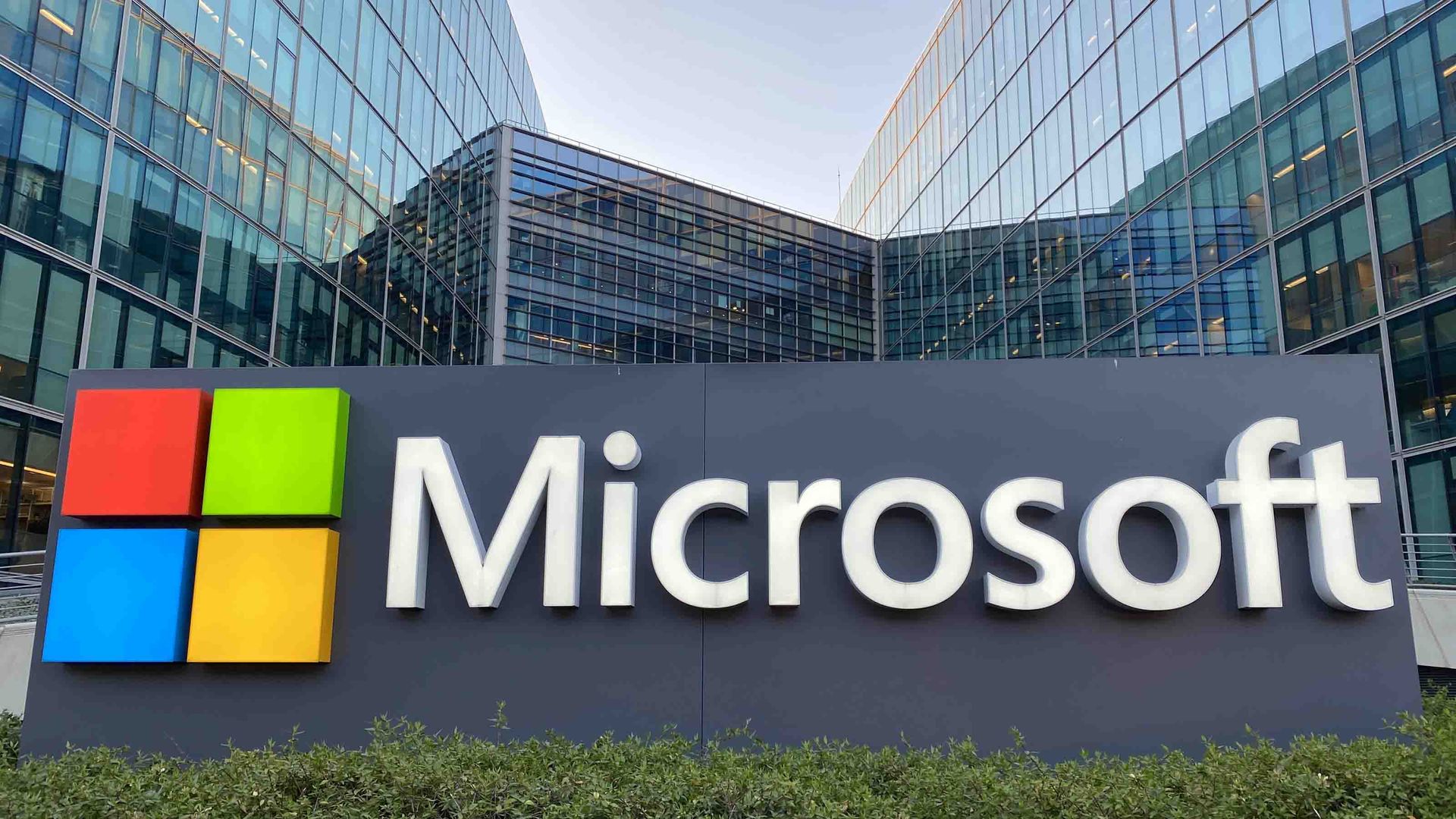
Microsoft
- Market value: $2.07 trillion
- Dividend yield: 1.0%
Microsoft (MSFT (opens in new tab), $277.66) is a major software company with tentacles in every area of the industry: operating systems, cloud, gaming, artificial intelligence (AI) and application software.
MSFT has been around since 1975. More importantly, it has paid a dividend for the last 19 years, including 14 consecutive years of dividend growth. Its powerful free cash flow is more than sufficient to cover dividends, share repurchases, acquisitions and debt reduction.
For example, Microsoft pays a $2.72 per-share annual dividend, up 9.7% over last year, and it's likely to rise a similar amount this year. That gives MSFT stock an ample 1.0% dividend yield. And over the last 12 months ending Dec. 31, 2022, Microsoft generated $84.3 billion in free cash flow. That more than covered the $19 billion dividend cost, as well as $28 billion in share buybacks.
This is because Microsoft's Office, LinkedIn and cloud services products (Productivity and Business Processes division) enjoy strong appeal with consumers (up 7% in the latest quarter). In addition, its other revenue in Intelligent Cloud grew 18% last quarter. The bottom line is that Microsoft's products are still relevant and the company is growing nicely.
In addition, MSFT stock is not that expensive, relatively speaking, trading at just 29.8 times earnings forecast for the fiscal year ending June 2023, and 25 times fiscal 2024 earnings. It also spent $4.6 billion on buybacks last quarter, an $18.4 annualized rate. That tends to increase both its earnings and dividends per share going forward.
Given its healthy dividend yield, moderate multiple and strong buyback program, investors might expect that the blue chip stock will do reasonably well over the next year.
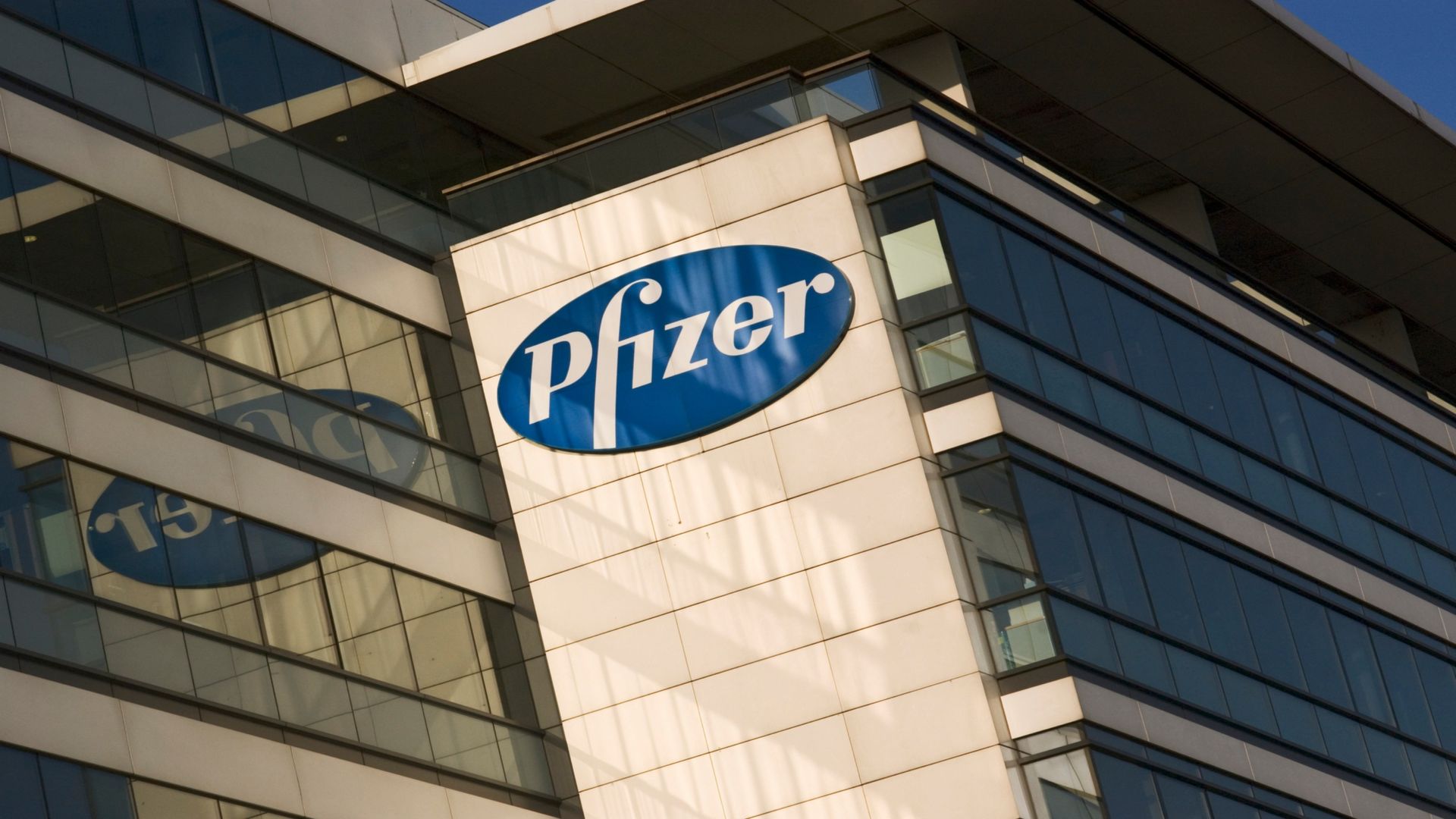
Pfizer
- Market value: $226.8 billion
- Dividend yield: 4.0%
Pfizer (PFE (opens in new tab), $40.18) is a diversified pharmaceutical company that offers medicines and vaccines in a broad spectrum of therapeutic areas. Pfizer has a strong foundation of diverse drugs that produce strong cash flows for its shareholders.
Moreover, its huge size – $100.3 billion in revenue in 2022, including 13% year-over-year growth in Q4 alone – allows it to spend large amounts on R&D and capital expenditures. This gives PFE the kind of economies of scale that drug development requires.
For example, in the last year ending Dec. 31, 2022, Pfizer generated $26 billion in free cash flow, after all capex spending and working capital needs. That more than covered the company's $9 billion in dividends and $2 billion in share buybacks.
However, going forward, Pfizer projects lower revenue, as the COVID-19 vaccine revenue windfall eases back in 2023. Nevertheless, it still projects non-COVID revenue will be up 7% to 9% in 2023.
This should still produce enough cash flow to cover its annual dividend of $1.64 per share. For example, analysts project earnings will be $3.40 per share in 2023, which is over twice the dividend payment. That makes its 4.1% dividend yield very secure. That is especially the case as Pfizer had paid a dividend for the past 33 years, including 12 consecutive years of dividend growth.
In addition, the Dow stock is very inexpensive at just 12 times earnings projected for this year. Combined with its strong free cash flow and its high dividend yield, investors should consider PFE as one of the best defensive stocks going forward.

Coca-Cola
- Market value: $259.2 billion
- Dividend yield: 3.0%
Coca-Cola (KO (opens in new tab), $59.92) is a well-known beverage company that has long produced consistently growing earnings, cash flow and dividends. Moreover, Coca-Cola has been buying back shares over and above the amount it issues to employees. This also helps increase its earnings and dividends on a per share basis.
In 2022, Coca-Cola's sales were up 11% to $43 billion, and on a non-GAAP "organic" basis, they grew 16%. This was composed of an 11% rise in prices, as well as a 5% increase in concentrate volume.
Moreover, KO's free cash flow was healthy at $9.5 billion. Although that was down from the prior year, it still represents a very respectable 22.7% of total sales. In other words, almost 23% of all Coca-Cola's sales goes straight to the company's net cash pile, before it spends money on dividends, buybacks and debt reduction.
In addition, Coca-Cola says it is gaining market share in the nonalcoholic ready-to-drink ("NARTD") beverages segments.
As a result, investors can continue to expect that Coca-Cola will keep raising its dividend as it has for the past 60 years straight. That is quite an achievement, and is likely one reason why KO is one of Warren Buffett's favorite stocks. The famed value investor and CEO of Berkshire Hathaway (BRK.A (opens in new tab)) has held shares in the company for almost 35 years, since 1988. Berkshire's stake in KO stock is now up to 9.25%, according to Coca-Cola's latest proxy.
Given that KO is at just 27 times this year's earnings and 23 times next year's earnings, it looks moderately priced, given its growth. Along with its 3% yield, KO is one of the best defensive stocks to buy.

Exxon Mobil
- Market value: $421.0 billion
- Dividend yield: 3.5%
Exxon Mobil (XOM (opens in new tab), $103.41) is one of the biggest oil and gas companies in the world, with revenues last year over $400 billion ($413.7 billion), up almost 45% from 2021 ($285.6 billion). This company has a long history, a solid brand, and is essentially a cash cow. Moreover drivers are going to need oil and gas products for a good while, despite the move to electric vehicles.
More importantly, cash flow went through the roof. The company generated $62.1 billion in free cash flow after all its capex spending.
As for fiscal 2023, analysts expect to see slightly lower revenue at $397 billion. And given how much oil prices have fallen so far this quarter, those estimates may end up drifting lower. Nevertheless, the company is still likely to produce a significant amount of free cash flow going forward. For example, even if FCF drops by 20% over the year, it still means Exxon will produce at least $50 billion in FCF throughout 2022.
That will be more than enough to cover the $3.64 per share annual dividend. This costs Exxon $14.8 billion annually, given that it has 4.07 billion shares outstanding. Moreover, XOM's management announced an increase in its share-repurchase program, with up to $35 billion of cumulative share repurchases in 2023-2024. This implies it will buy back $17.5 billion on average for both years, compared to $14.9 billion in share repurchases in 2022. This will drop the share count and improve earnings and dividends per share by over 17.5% over both years.
What's more, XOM is one of the best value stocks at the moment, trading at just 9.9 times forward earnings. Moreover, Exxon has grown its dividend every year over the past 20 years, and its 3.5% dividend yield is more than covered by expected cash flow going forward. These points make XOM stock one of the best defensive stocks for investors right now.

Oracle
- Market value: $237.3 billion
- Dividend yield: 1.8%
Oracle (ORCL (opens in new tab), $87.78) is a major cloud software and services company that offers enterprise resource planning and enterprise performance management products.
The company recently announced its revenues were up 18% year-over-year in U.S. dollars, and up 21% in constant currency, to $12.4 billion. Moreover, the company is extremely profitable and pays a hefty dividend – especially for a tech stock – along with share buybacks.
For example, Oracle's non-GAAP operating margins for the quarter were an impressive 42%. This puts it in the upper tier of profitable software companies. In addition, Oracle generated $7.3 billion in free cash flow during the last 12 months (LTM). That represents a healthy 15% of its LTM revenues. This FCF allows Oracle to pay a decent dividend and buy back its shares.
For example, the software company just hiked its dividend by 25% to $1.60 per share annually, giving ORCL stock a 1.8% dividend. This is the eighth year in a row ORCL has raised its dividend, showing that it is likely to be hiked again next year. Moreover, Oracle has bought back a significant amount of its shares in the past two years, although this year it has scaled back.
At just 17 times this year's earnings forecasts, the stock looks to be moderately priced. For example, in the last five years, its average price/earnings multiple has been 27.5 times historical earnings, according to Morningstar. That means it is still well below its average historical earnings if analysts' projections for EPS of $5.04 comes to pass.
Given its solid revenue growth, operating margins, free cash flow, dividends and buybacks, Oracle stock looks like one of the best defensive stocks to buy right now.

Mark R. Hake, CFA, is a Chartered Financial Analyst and entrepreneur. He has been writing on stocks for over six years and has also owned his own investment management and research firms focused on U.S. and international value stocks, for over 10 years. In addition, he worked on the buy side for investment firms, hedge funds, and investment divisions of insurance companies for the past 36 years. Lately, he is also working as Chief Strategy Officer for a tech start-up company, Foldstar Inc, based in Princeton, New Jersey.
-
-
 For Best Tax Savings, Year-Round Tax Planning Is Essential
For Best Tax Savings, Year-Round Tax Planning Is EssentialFor optimal, ongoing tax reduction, consider employing these nine strategies throughout the entire year.
By Andy Leung, Private Wealth Adviser • Published
-
 From SECURE Act to SECURE 2.0: Is Your Estate Plan Safe?
From SECURE Act to SECURE 2.0: Is Your Estate Plan Safe?The ever-evolving legislative landscape provides both challenges and opportunities when it comes to making plans for your retirement and your estate. A key focus: tax planning.
By Lindsay N. Graves, Esq. • Published
-
 Stock Market Today: UPS, First Republic Earnings Drag on Stocks
Stock Market Today: UPS, First Republic Earnings Drag on StocksDismal guidance from logistics giant UPS and dreary deposit data from regional lender First Republic kept a lid on the major indexes Tuesday.
By Karee Venema • Published
-
 If You'd Put $1,000 Into Microsoft Stock 20 Years Ago, Here's What You'd Have Today
If You'd Put $1,000 Into Microsoft Stock 20 Years Ago, Here's What You'd Have TodayMicrosoft Microsoft stock has lost almost $500 billion in value since its all-time high, but bulls say it's only a matter of time before it reclaims its heights.
By Dan Burrows • Published
-
 Stock Market Today: Stocks Wobble Ahead of Big Tech Earnings
Stock Market Today: Stocks Wobble Ahead of Big Tech EarningsThe major indexes made modest moves ahead of earnings from Microsoft, Alphabet and Meta Platforms.
By Karee Venema • Published
-
 Stock Market Today: P&G Earnings Headline Quiet Day for Stocks
Stock Market Today: P&G Earnings Headline Quiet Day for StocksWhile the major indexes failed to make big moves today, consumer staples giant Procter & Gamble popped after earnings.
By Karee Venema • Published
-
 Stock Market Today: Stocks Close Mixed Ahead of Inflation Data
Stock Market Today: Stocks Close Mixed Ahead of Inflation DataMarket participants fretted over the looming CPI report, while mega-cap tech names fell amid slower demand for cloud-based services.
By Dan Burrows • Published
-
 Stock Market Today: Stocks Close Mixed on Rate Hike Jitters
Stock Market Today: Stocks Close Mixed on Rate Hike JittersA solid March jobs report, upcoming inflation data and a plunge in shipments of Apple's Mac computers restrained sentiment.
By Dan Burrows • Published
-
 Best Cash Cows to Buy Now
Best Cash Cows to Buy NowCash cows bring in loads of free cash flow that help them sustain dividends and buybacks – and generate long-term value for investors.
By Mark R. Hake, CFA • Published
-
 Stock Market Today: Stocks Finish Mixed After Surprise OPEC+ Announcement
Stock Market Today: Stocks Finish Mixed After Surprise OPEC+ AnnouncementThe Organization of the Petroleum Exporting Countries and its allies over the weekend announced a surprise cut to crude production.
By Karee Venema • Published




